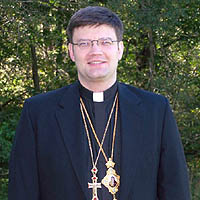 Bishop Paul Peter Jesep
Bishop Paul Peter Jesep
Has the Diaspora failed? Can more be done?
— By Bishop Paul Peter Jesep
 Bishop Paul Peter Jesep
Bishop Paul Peter Jesep
|
There is a spirited debate going on, at least in the United States, as to whether Diaspora Ukrainian trade, academic and professional organizations have maximized opportunities to share information with the greater public about the political, economic and historic relationship between Kyiv and Moscow. It's undeniable that the average radio listener, television viewer, or newspaper reader who may be getting their first real glimpse into the Ukrainian soul is receiving it through a filtered Russian perspective.
Ukraine is often portrayed as an appendage of greater Russia. Sometimes it almost appears that this ancient land is little better than a break away region. Many Western scholars are offering a Russified view of the events now unfolding in Eastern Europe. This stems in part from the modest media and communications infrastructure at many Ukrainian organizations to reach a non-Ukrainian audience.
Telling other Ukrainians about their history doesn't achieve much. There has been much positive news about Ukraine. Rallies by ordinary Diaspora Ukrainians has helped to generate much media coverage in the West. But that image is not always accompanied by a coherent, consistent and ongoing message. Pictures are great, but what's the point if there's no lasting message. This is where Diaspora organizations are critical.
One of the most important strategies I've used in print and radio interviews why Americans should care about Ukraine stems from its own security. Ukraine is the second largest and potentially one of the richest nations in Europe. It is not in America's national security to see Russia exploit such a resource. Once that case is made, fellow citizens who would not normally care about a situation far removed from their families begin to listen. The Ukrainian cause must be made into their cause.
Think about the expression, "politics makes for strange bedfellows." Alliances are frequently formed by disparate groups because they agree on a common goal, but for different reasons. Diaspora Ukrainians want a free Ukraine for one reason and non-Ukrainians for another. Don't think that Poland or Lithuania was first in line to protest Russian interference because they were concerned about Ukrainian liberty. They did it out of pure self-interest. Once Ukraine was back under Moscow's thumb they could be next.
In the case of America, for example, journalists and commentators have a greater interest if they think that the United States could be threatened in the long-term. The message must be tailored to each specific audience. No one will care about Ukraine unless they may be threatened in the future. Because Diaspora Ukrainians think its important doesn't mean our neighbors or local elected officials will subscribe to the same views.
As an editorial writer who has spent a portion of my professional career in strategic media planning it seems that the most logical plan of attack is to create stronger communication departments at Diaspora organizations that:
In summary, Diaspora Ukrainian organizations must remember it's all about message, continuity and pragmatic strategic planning. It doesn't matter how noble one's cause or the brilliance of an idea. If you can't communicate their importance to a wide audience then it's just as well they didn't exist. Diaspora organizations need to be less romantic and a lot more Machiavellian.
Bishop Paul Peter Jesep is the Vicar General and Chancellor of the Archeparchy for the Ukrainian Autocephalous Orthodox Church of North and South America Sobornopravna. His Grace, a lawyer and political scientist by training, is a former legislative analyst to U.S. Senator Susan Collins (R-ME). He has served as a Communications Director for several state and region wide organizations in the Northeast. He has also studied at Bangor Theological Seminary (bts.org), the third oldest such school in the United States. His Grace may be reached at VladykaPaulPeter(a)aol.com. The views expressed here are strictly personal.